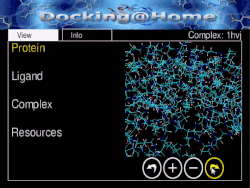|
Docking@Home
Docking@Home was a volunteer computing project hosted by the University of Delaware and running on the Berkeley Open Infrastructure for Network Computing (BOINC) software platform. It models protein-ligand docking using the CHARMM program. Volunteer computing allows an extensive search of protein-ligand docking conformations and selection of near-native ligand conformations are achieved by using ligand based hierarchical clustering.[2] The ultimate aim was the development of new pharmaceutical drugs. The project was retired on May 23, 2014.[1] See alsoReferences
Further reading
External linksWikimedia Commons has media related to Docking@Home.
|
||||||||||
